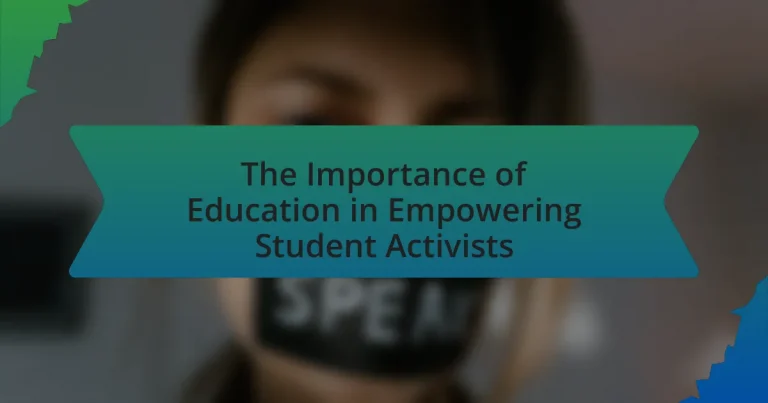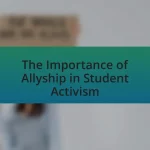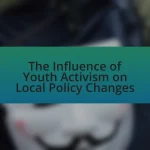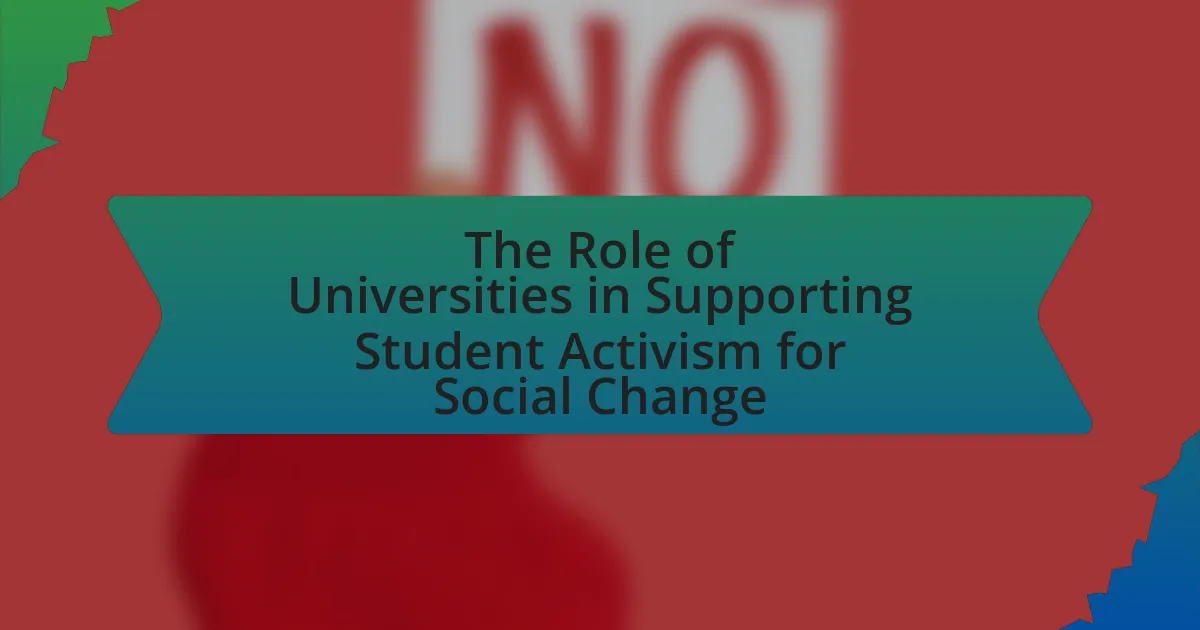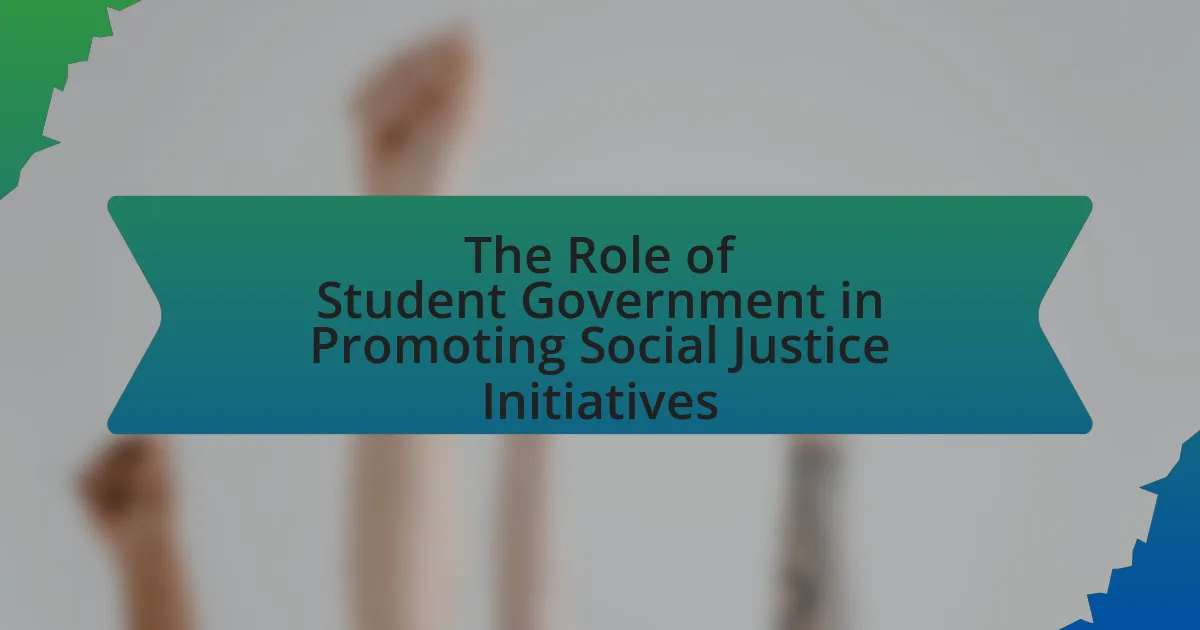The article focuses on the significance of education in empowering student activists. It highlights how education equips students with critical thinking skills, knowledge of social issues, and effective communication abilities, which are essential for informed activism. The article discusses various forms of education, including formal education, experiential learning, and community-based education, and their impact on fostering civic engagement and social justice advocacy. Additionally, it addresses the challenges student activists face, such as institutional resistance and systemic barriers, while emphasizing strategies and resources that can enhance their educational experiences and activism efforts.
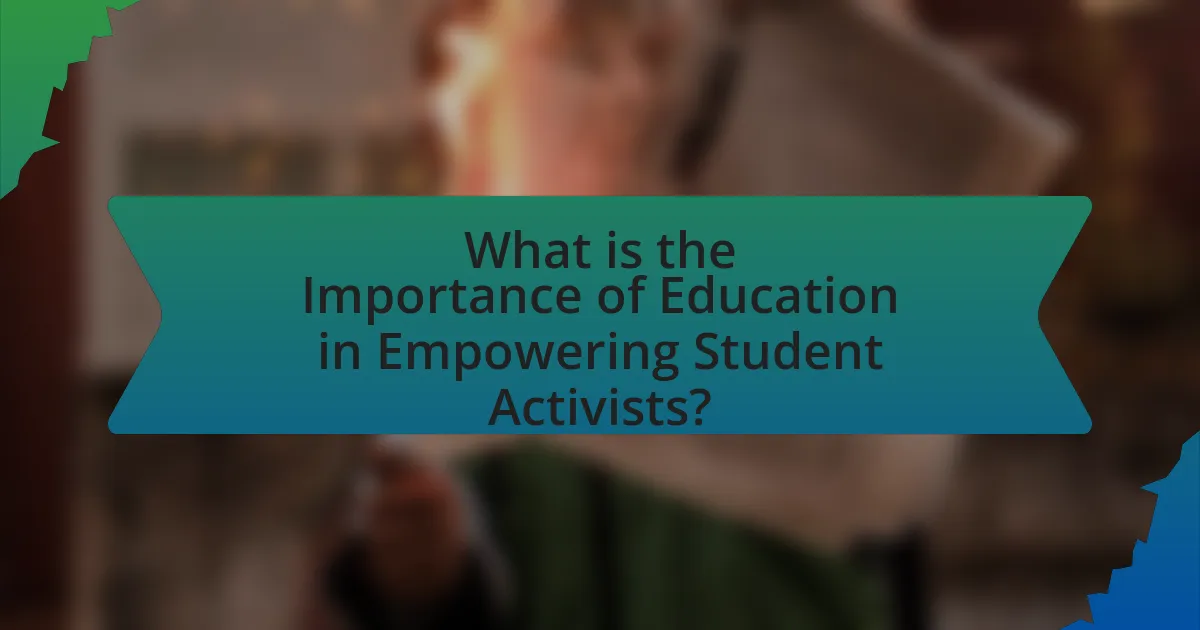
What is the Importance of Education in Empowering Student Activists?
Education is crucial in empowering student activists as it equips them with critical thinking skills, knowledge of social issues, and the ability to articulate their ideas effectively. Through education, students gain awareness of their rights and the mechanisms of change, enabling them to engage in informed activism. For instance, studies show that educated individuals are more likely to participate in civic activities and advocate for social justice, as evidenced by the increased voter turnout among college graduates compared to those with lower educational attainment. This correlation highlights how education fosters a sense of agency and responsibility, empowering students to challenge injustices and mobilize their peers for collective action.
How does education influence student activism?
Education significantly influences student activism by equipping students with critical thinking skills, awareness of social issues, and the ability to articulate their perspectives. Through formal education, students learn about historical movements, civic responsibilities, and the mechanisms of change, which fosters a sense of agency and empowerment. For instance, research from the American Educational Research Association indicates that students who engage in service-learning programs are more likely to participate in civic activities and advocacy efforts. This connection between education and activism is further supported by studies showing that higher levels of education correlate with increased political engagement and activism among youth.
What skills does education provide to student activists?
Education provides student activists with critical thinking, communication, and organizational skills. Critical thinking enables them to analyze social issues and develop informed positions. Effective communication skills allow them to articulate their ideas and mobilize support, while organizational skills help them plan and execute campaigns efficiently. Research indicates that students engaged in activism often report enhanced problem-solving abilities and increased confidence, which are essential for effective advocacy.
How does education shape the values and beliefs of student activists?
Education shapes the values and beliefs of student activists by providing critical thinking skills, fostering awareness of social issues, and encouraging civic engagement. Through exposure to diverse perspectives and historical contexts, education enables students to understand systemic injustices and motivates them to advocate for change. Research indicates that students who participate in service-learning programs, for example, are more likely to develop a commitment to social justice and community involvement, as evidenced by a study published in the Journal of Higher Education by authors Eyler and Giles, which found that such programs significantly enhance students’ civic responsibility.
Why is education crucial for effective activism?
Education is crucial for effective activism because it equips individuals with the knowledge and skills necessary to understand complex social issues and advocate for change. Through education, activists gain critical thinking abilities, enabling them to analyze problems, develop informed strategies, and communicate effectively with diverse audiences. For instance, studies show that educated individuals are more likely to engage in civic activities, as evidenced by the National Civic Engagement Survey, which found that higher education levels correlate with increased participation in social movements. This foundational knowledge empowers activists to challenge injustices and mobilize communities effectively.
What role does critical thinking play in student activism?
Critical thinking is essential in student activism as it enables students to analyze complex social issues, evaluate different perspectives, and develop informed arguments. This cognitive skill allows student activists to discern credible information from misinformation, fostering effective advocacy. For instance, research by the American Association of Colleges and Universities indicates that critical thinking skills are linked to higher levels of civic engagement among students, demonstrating that those who engage in critical analysis are more likely to participate in activism. Thus, critical thinking not only enhances the quality of student activism but also empowers students to drive meaningful change in their communities.
How does education enhance communication skills for activists?
Education enhances communication skills for activists by providing them with critical thinking, public speaking, and writing skills essential for effective advocacy. Through structured learning environments, activists gain the ability to articulate their ideas clearly and persuasively, which is crucial for mobilizing support and influencing public opinion. Studies show that individuals with higher education levels often demonstrate improved communication abilities, as they engage in discussions, debates, and presentations that refine their skills. For instance, a report by the National Center for Education Statistics indicates that college graduates are more likely to participate in civic activities, highlighting the link between education and enhanced communication proficiency in activism.
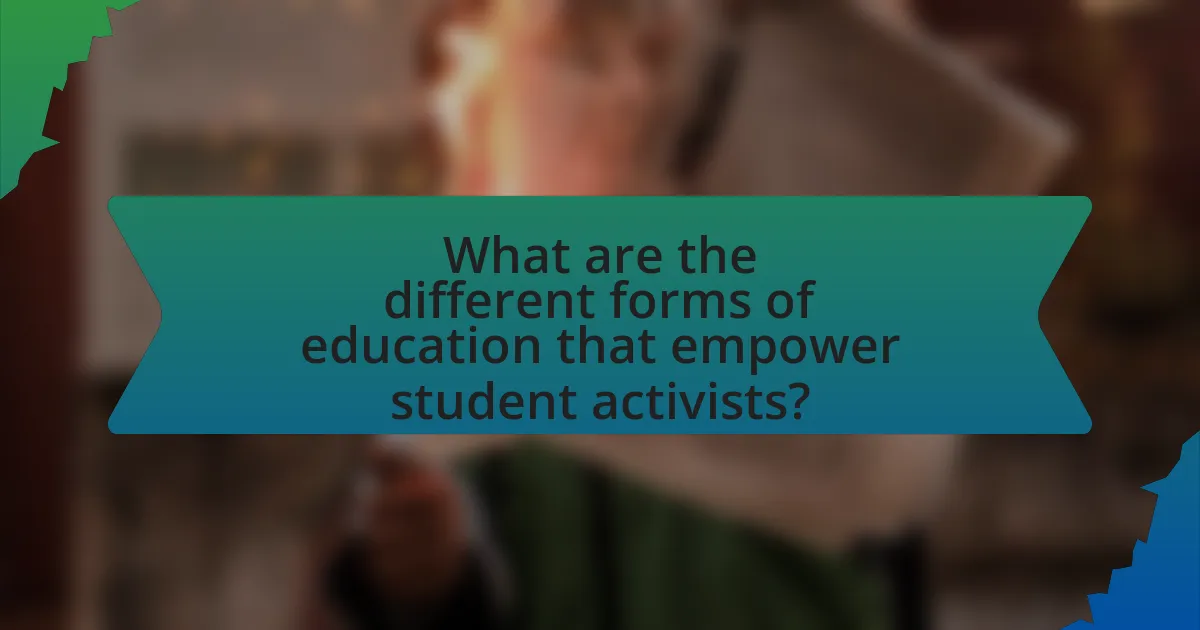
What are the different forms of education that empower student activists?
Different forms of education that empower student activists include formal education, experiential learning, and community-based education. Formal education provides foundational knowledge about social issues, governance, and rights, often through curricula that include subjects like political science and sociology. Experiential learning, such as internships and volunteer opportunities, allows students to apply their knowledge in real-world contexts, fostering practical skills and activism experience. Community-based education engages students with local organizations and movements, enhancing their understanding of grassroots activism and social justice. Research indicates that students involved in these educational forms are more likely to participate in civic activities and advocacy, demonstrating the effectiveness of education in empowering activism.
How do formal education systems contribute to student activism?
Formal education systems contribute to student activism by providing a structured environment that fosters critical thinking, civic engagement, and awareness of social issues. Through curricula that include history, social studies, and ethics, students learn about their rights and the importance of participation in democratic processes. For instance, research by the Center for Information and Research on Civic Learning and Engagement (CIRCLE) indicates that students who engage in service-learning and civic education are more likely to participate in activism. Additionally, formal education often encourages collaboration and dialogue among peers, which can lead to collective action on issues such as climate change, racial equality, and social justice. This educational foundation equips students with the knowledge and skills necessary to advocate for change effectively.
What subjects are most beneficial for aspiring student activists?
Political science, sociology, and environmental studies are the most beneficial subjects for aspiring student activists. Political science provides insights into governance, policy-making, and the political process, which are essential for understanding how to effect change. Sociology helps activists comprehend social structures, inequalities, and group dynamics, enabling them to address issues effectively. Environmental studies equip students with knowledge about sustainability and ecological issues, which are increasingly relevant in activism today. These subjects collectively enhance critical thinking, advocacy skills, and a comprehensive understanding of societal challenges, thereby empowering student activists to make informed decisions and drive meaningful change.
How can extracurricular activities support activist education?
Extracurricular activities can significantly support activist education by providing students with practical experiences that enhance their understanding of social issues and civic engagement. These activities, such as debate clubs, environmental groups, and social justice organizations, allow students to apply theoretical knowledge in real-world contexts, fostering critical thinking and leadership skills. Research indicates that participation in such activities increases students’ awareness of social justice issues and their ability to mobilize for change, as evidenced by a study from the National Association of Student Personnel Administrators, which found that students involved in extracurriculars are more likely to engage in community service and advocacy efforts.
What is the impact of informal education on student activism?
Informal education significantly enhances student activism by fostering critical thinking, social awareness, and leadership skills. This type of education often occurs outside traditional classroom settings, such as through community programs, peer-led initiatives, and social movements, which provide students with practical experiences and knowledge relevant to societal issues. Research indicates that students engaged in informal educational settings are more likely to participate in activism, as they develop a deeper understanding of social justice and civic responsibility. For instance, a study by the National Youth Leadership Council found that youth involved in service-learning programs demonstrated increased civic engagement and a greater likelihood of participating in activism.
How do community programs foster activism among students?
Community programs foster activism among students by providing them with opportunities to engage in social issues and develop leadership skills. These programs often include workshops, volunteer activities, and mentorship, which equip students with the knowledge and tools necessary to advocate for change. For instance, research from the National Youth Leadership Council indicates that students involved in service-learning programs demonstrate increased civic engagement and a greater likelihood of participating in activism. By connecting students with their communities and encouraging collaboration, these programs create a supportive environment that nurtures a sense of responsibility and empowerment among young activists.
What role do peer networks play in educating student activists?
Peer networks play a crucial role in educating student activists by facilitating the exchange of knowledge, resources, and strategies for effective activism. These networks create a supportive environment where students can share experiences, learn from one another, and develop critical skills necessary for advocacy. Research indicates that peer-led initiatives enhance engagement and retention of information, as students often feel more comfortable discussing issues with their peers than with authority figures. For example, a study by the University of California found that peer education programs significantly improved participants’ understanding of social justice issues and mobilization techniques. This collaborative learning fosters a sense of community and empowerment, essential for effective activism.
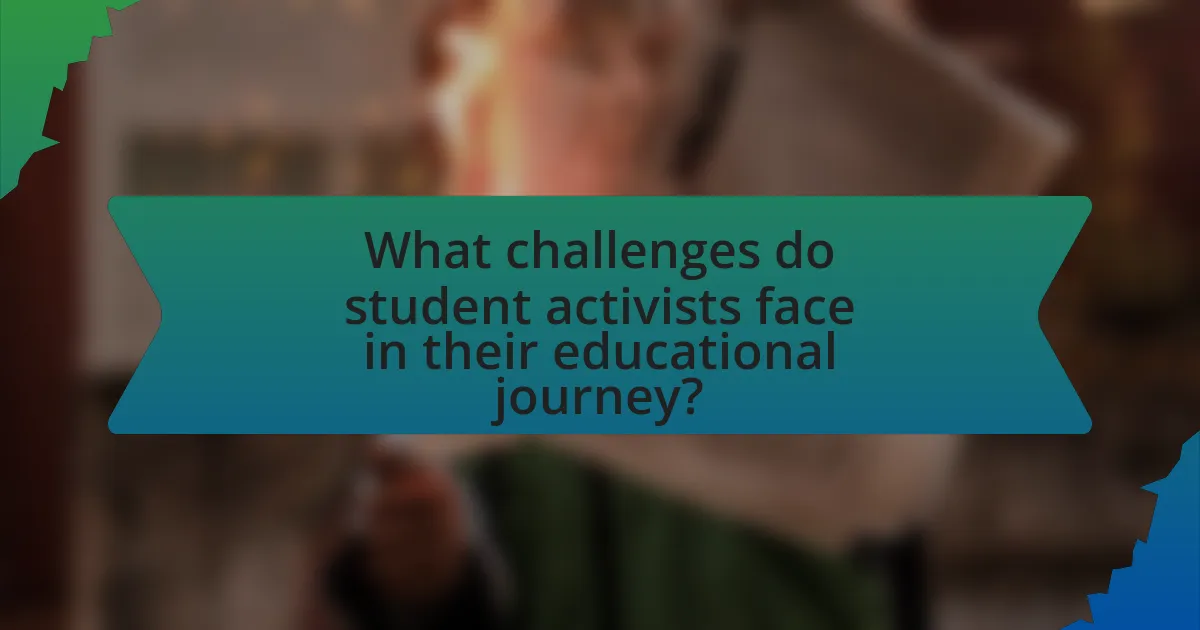
What challenges do student activists face in their educational journey?
Student activists face significant challenges in their educational journey, including institutional resistance, lack of resources, and social stigma. Institutional resistance often manifests as administrative pushback against activism, which can hinder students’ ability to organize and advocate for change. A study by the American Association of University Professors found that 60% of student activists reported facing disciplinary actions from their institutions, which can create a hostile environment for activism. Additionally, lack of resources, such as funding for events or access to meeting spaces, limits the effectiveness of student-led initiatives. Social stigma also plays a role, as student activists may encounter peer isolation or negative perceptions from faculty and administration, further complicating their educational experience. These challenges collectively impact the ability of student activists to engage fully in their education while pursuing social justice goals.
How do systemic barriers affect student activism?
Systemic barriers significantly hinder student activism by limiting access to resources, representation, and opportunities for engagement. These barriers, such as socioeconomic disparities, institutional policies, and discrimination, create an environment where marginalized students struggle to voice their concerns and mobilize effectively. For instance, research from the American Council on Education indicates that students from low-income backgrounds face challenges in participating in activism due to financial constraints and lack of institutional support. Consequently, these systemic obstacles can lead to diminished student engagement and a lack of diverse perspectives in activism efforts.
What are the common obstacles in accessing quality education for activists?
Common obstacles in accessing quality education for activists include financial constraints, lack of institutional support, and systemic discrimination. Financial constraints often limit activists’ ability to afford tuition and educational resources, as many come from marginalized backgrounds. Lack of institutional support can manifest in inadequate access to mentorship, networking opportunities, and resources tailored to their needs. Systemic discrimination, including gender, racial, and socioeconomic biases, can hinder activists’ educational experiences and opportunities, as evidenced by studies showing that marginalized groups face higher dropout rates and lower access to advanced educational programs.
How can student activists overcome these challenges?
Student activists can overcome challenges by leveraging education to enhance their advocacy skills and knowledge. Education equips them with critical thinking, effective communication, and organizational skills necessary for mobilizing support and addressing social issues. For instance, studies show that educated individuals are more likely to engage in civic activities, as they possess a deeper understanding of political systems and social justice (National Conference on Citizenship, 2018). Additionally, forming alliances with faculty and community organizations can provide resources and mentorship, further empowering student activists to navigate obstacles effectively.
What strategies can enhance the educational experience for student activists?
Engaging student activists in experiential learning opportunities enhances their educational experience. This can include internships, community service projects, and participation in advocacy campaigns, which provide practical skills and real-world applications of their studies. Research indicates that experiential learning increases retention rates and fosters critical thinking, as evidenced by a study from the National Society for Experiential Education, which found that 85% of students reported improved understanding of course material through hands-on experiences. Additionally, fostering a supportive community through mentorship programs and peer networks can further empower student activists, as collaboration and shared experiences enhance learning outcomes and personal growth.
How can mentorship programs support student activists in their education?
Mentorship programs can support student activists in their education by providing guidance, resources, and networking opportunities that enhance their advocacy skills and academic performance. These programs connect students with experienced mentors who can share knowledge about effective activism strategies, help navigate institutional challenges, and offer emotional support. Research indicates that students involved in mentorship programs often experience improved academic outcomes, increased confidence, and a greater sense of belonging, which are crucial for sustaining their activism efforts. For instance, a study published in the Journal of Educational Psychology found that mentorship positively influences students’ engagement and motivation, leading to higher retention rates in educational settings.
What resources are available to empower student activists through education?
Educational resources available to empower student activists include workshops, online courses, mentorship programs, and access to research materials. Workshops often focus on skills such as public speaking, organizing, and advocacy strategies, which are crucial for effective activism. Online platforms like Coursera and edX offer courses on social justice, political science, and community organizing, enabling students to gain knowledge at their own pace. Mentorship programs connect students with experienced activists who provide guidance and support, fostering a sense of community and shared purpose. Additionally, access to research materials, including academic journals and case studies, equips student activists with evidence-based information to support their causes. These resources collectively enhance the capabilities of student activists, enabling them to engage more effectively in social and political issues.
What best practices can student activists adopt to maximize their educational impact?
Student activists can maximize their educational impact by engaging in collaborative learning, utilizing digital platforms for outreach, and focusing on evidence-based advocacy. Collaborative learning fosters diverse perspectives, enhancing critical thinking and problem-solving skills, which are essential for effective activism. Utilizing digital platforms, such as social media and online forums, allows activists to reach a broader audience, share resources, and mobilize support efficiently. Evidence-based advocacy ensures that their initiatives are grounded in research and data, increasing credibility and effectiveness. For instance, studies show that campaigns backed by solid data are more likely to influence policy changes, as seen in the successful youth-led climate strikes that utilized scientific research to advocate for environmental reforms.
